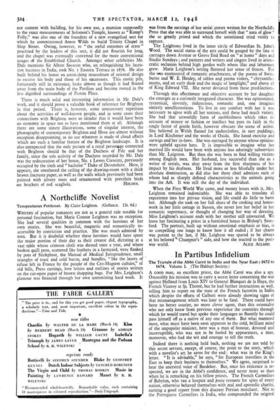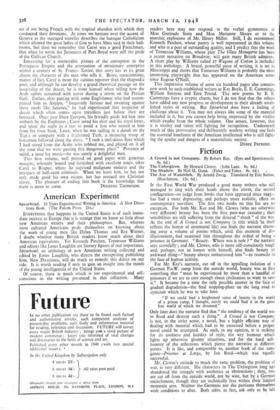In Partibus Infidelium
A GOOD man, an excellent priest, the Abbe Carre was also a spy. Ostensibly his mission was to carry a secret letter concerning the war against Holland from Louis XIV to General Blanquet de la Haye, the French Viceroy at Thome, but he had further instructions as well, telling him to report on the state of the French factories in India, which despite the efforts of Colbert were already showing signs of that mismanagement which was later to be fatal. There could have been no better courier, no more clever agent, than this orientalist who not only knew from previous experience the countries through which he would travel but spoke their languages so fluently he could pass himself off as a native of any one of them. But what mattered most, what must have been soon apparent to the cold, brilliant mind of the unpopular minister, here was a man of honour, devoted and incorruptible, who was not to be fooled by appearances, a man, moreover, who had the wit and courage to tell the truth.
Indeed there is nothing held back, nothing we are not told by this secret servant, except, of course, the point to the story, which with a novelist's art he saves for the end : what was in the King's letter. " It is advisable," he says, " for European travellers in the East to keep their business to themselves." We agree, surprised to hear the ancestral voice of Baedeker. But, once his reticence is re- spected, we are in the Abbe's confidence, and never more so than when he is remarking on his fellow priests. The French Carmelites of Babylon, who 'ran a hospice and poste restante for spies of every nation, otherwise behaved themselves with zeal and apostolic charity, earning a good report from this discreet Persian merchant. Not so the Portuguese Carmelites in India, who compounded the original
sin of not being French with the tropical abandon with which they conducted their devotions. At times we hesitate over the accent of Geneva as the outraged traveller describes the. baroque Catholicism which allowed the great ladies of Goa to have Mass said in their bed- rooms, but then we remember that Garth was a good Frenchman, that when he wrote the Jansenists of Port Royal were still the pride of the Gallican Church.
Interesting for a memorable picture of the corruption in the Portuguese Empire and the attenuation of missionary enterprise within a century of St. Francis Xavier, this story has as its great charm the character of the man who tells it. Brave, conscientious, matter of fact, Carre is more the curious reporter than the rhapsodic poet, and although he can develop a grand rhetorical passage on the hospitality of the desert, he is more himself when telling how the Arab sailors screamed With terror during a storm on the Persian Gulf. Earlier, after parting with some Englishmen who had accom- panied him to Aleppo, " frequently furious and swearing against these roads like lunatics," he had experienced that suspicion of deceit which often comes upon travellers just before they are betrayed. Once past Dura Europos, his friendly guide led him into ambush by the Euphrates ; Carte saved his shirt and his royal letter, and spent the night in a tree to avoid a lion who roared at him from the river bank. Later, when he was sailing in a danak on the Tigr:s in company with a frightened Turk, a menacing troop of horsemen followed along the shore. " I took a melodious flute which I had saved from the Arabs who robbed me, and played on it all the time that we were passing this dangerous place." Presence of mind, a taste for music—he was surely a delightful man. This first volume, well printed on good paper with generous margins, solemnly bound and furnished with excellent maps, takes Carre to Bijapur, where- he survived malignant malaria and the intrigues of half-caste criminals. When we leave him, he has not only made good his own escape, but has rescued ten Christian slaves. The pleasure of ending this book is the knowledge that



































 Previous page
Previous page